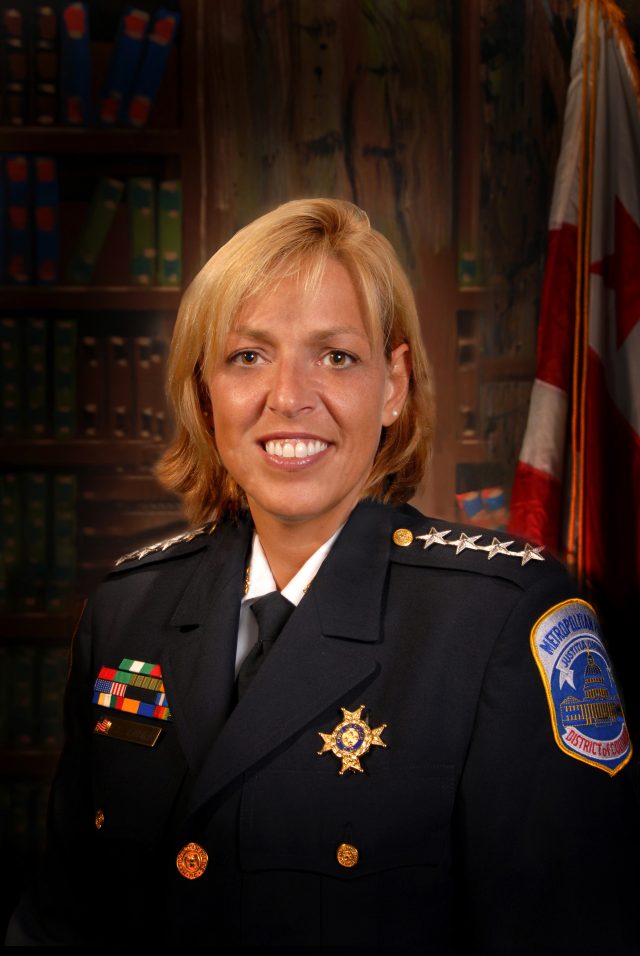KNOW YOUR RIGHTS
by Timothy B. Lee – July 24 2012
DC police chief announces shockingly reasonable cell camera policy
She bans DC cops from confiscating cell cameras or harrassing their owners.

DC Police Chief Cathy Lanier
This blog has criticized and published a number of stories about police officers, et ux, interfering with citizens who are trying to record the actions of police in public places. In some cases, cops have arrested citizens for making recordings in public. In others, they’ve seized cell phones and deleted the recordings.
The courts and the Obama administration have both said that these activities violate the Constitution. At least one police department has gotten the message loud and clear.
In a new legal directive first noticed by DCist, Washington DC Police Chief Cathy Lanier explains the constitutional rights of DC citizens and gives her officers detailed instructions for respecting them. She addresses a number of scenarios that have led to controversy in recent years.
Don’t interfere with recordings
“A bystander has the same right to take photographs or make recordings as a member of the media,” Chief Lanier writes. The First Amendment protects the right to record the activities of police officers, not only in public places such as parks and sidewalks, but also in “an individual’s home or business, common areas of public and private facilities and buildings, and any other public or private facility at which the individual has a legal right to be present.”
Lanier says that if an officer sees an individual recording his or her actions, the officer may not use that as a basis to ask the citizen for ID, demand an explanation for the recording, deliberately obstruct the camera, or arrest the citizen. And, she stresses, under no circumstances should the citizen be asked to stop recording.
This applies even in cases where the citizen is recording “from a position that impedes or interferes with the safety of members or their ability to perform their duties.” In that situation, she says, the officer may ask the person to move out of the way, but the officer “shall not order the person to stop photographing or recording.”
She also notes, “a person has the right to express criticism of the police activity being observed.”
No seizing cameras or deleting recordings
Lanier’s directive addresses another scenario which is becoming increasingly common: a civilian takes a photograph or recording a police officer believes could constitute evidence of a crime. Under Lanier’s directive, an individual cop cannot take a recording device away from a citizen without his or her consent. “Consent to take possession of a recording device or medium must be given voluntarily,” she writes.
In the event that the cop believes the recording is needed for evidence but its owner isn’t willing to part with it, the officer is required to call his supervisor. The device or recording media can be seized only if the supervisor is present, only if “there is probable cause to believe that the property holds contraband or evidence of a crime,” and only if “the exigencies of the circumstances demand it or some other recognized exception to the warrant requirement is present.”
In non-emergency situations, Lanier directs her subordinates to obtain a search warrant before accessing any information on a seized device. She writes, “photographs or recordings that have been seized as evidence and are not directly related to the exigent purpose shall not be reviewed” by the police.
Finally, she emphasizes police officers “shall not, under any circumstances, erase or delete, or instruct or require any other person to erase or delete, any recorded images or sounds from any camera or other recording device. [Officers] shall maintain cameras and other recording devices that are in Department custody so they can be returned to the owner intact with all images or recordings undisturbed.”
If Chief Lanier’s subordinates follow her instructions, it will not only help to avoid the expensive lawsuitsthat other cities have faced, it will also make for a more accountable police force. It’s hoped that police chiefs around the country follow Chief Lanier’s excellent example.
The above order was part of a settlement with Jerome Vorus, who sued the city after he was told to stop taking pictures of a traffic stop in Georgetown two years ago. The lawsuit was filed with the help of the American Civil Liberties Union.
